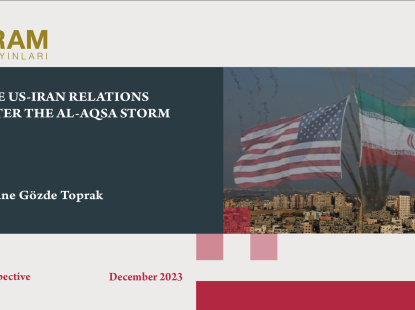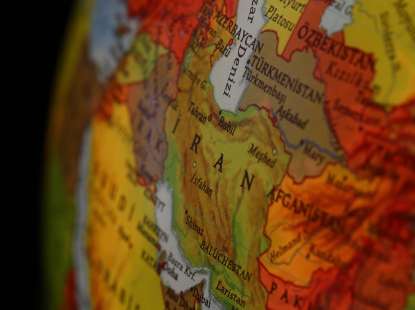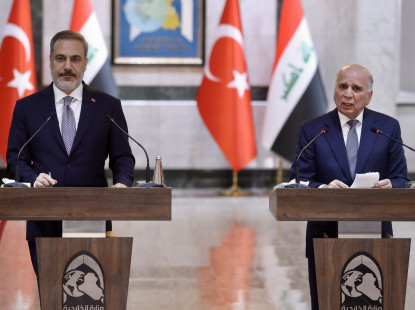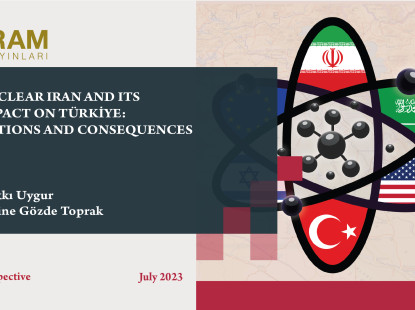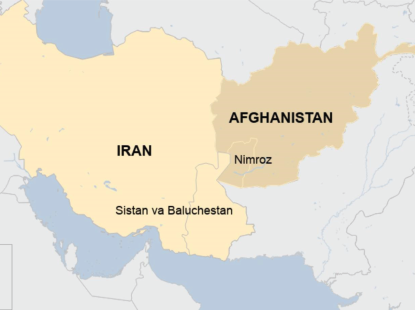2020, Trump, Iran and Bad Scenarios
The year 2020, which was dreadful for the whole world due to the global pandemic and the economic crises it caused, will be remembered as a year filled with especially harrowing memories for Iran. The unexpected attack at the beginning of the new year, along with the economic depression which has been revealed by the alarming financial indicators since 2018, demonstrated that Iran has faced one of the worst challenges of the last forty years against the US under Donald Trump. In practice, the leaders in Tehran gave one of the most rational responses to the killing of the General and his entourage, who has turned into a national hero in recent years, despite the epic rhetoric and threats of revenge, and thus the possibility of war with the US has been taken off the agenda.
The assassination of Qasem Soleimani and his entourage near Baghdad airport on January 3 was not the only crisis that Iran faced this year. The downing of a Ukrainian passenger plane in retaliation and the killing of many civilians, almost all of whom were Iranians, caused a strong reaction in the country. In this context, the parliamentary elections in February were dull despite all the incentives, campaigns and fatwas, and the voter turnout rate in the capital city Tehran fell to the lowest level in the last forty years. This was the deathblow for Rouhani’s government, which had already lost its cards against Trump. The Parliament, which is composed mostly of conservative members, also began to put forth that it is the “moderate” government and the Nuclear Deal signed with the US that lie behind the problems of the country.
When Rouhani’s government could not get over the election results, it was announced that the Covid-19 virus, which first occurred in China and claimed the lives of many people, was also seen in Iran. The lack of information regarding the identification of the virus led to inconsistencies in the statements of the authorities, and particularly in the early months, broad discussions came up concerning “biological attack” and “the real number of the cases and deaths”. With the spread of the virus in European countries in a short span of time as well, Iran raised its crisis management to a more reasonable level. Nevertheless, it was not possible to take strict social measures against the pandemic due to the economic situation, which has shrunk over the past two years because of the sanctions that the authorities called “economic terror”, and nearly a hundred thousand people lost their lives.
The challenges that Iran has faced throughout 2020 were not limited to domestic issues. In Iraq, Mustafa al-Kadhimi was elected as prime minister in consequence of the long-standing protests against Iran and corruption led by the Shiite youth in the southern parts of Iraq. Although some Hashd groups close to Iran's Revolutionary Guards Corps opposed Kadhimi’s prime ministry, who does not have a political background and is known for his distance from Iran. However, it has been claimed that Kadhimi has been on good terms with some figures in Rouhani’s government since the time of his service in the intelligence department. During the six-month prime ministry period of Kadhimi, it was intrinsically not possible for him to find solutions to the increased problems of Iraq. However, he was criticized by the young protesters for his largely pursuing the balances in the country and making concessions to Tehran.
Kadhimi struggled for making up the weakness of his institutional support, except for Muqtada al Sadr and Najaf's supreme religious authority, with his attempts in foreign policy and tried to improve relations with the Arab countries and Turkey. He promised to maintain and enhance the economic relations in the event that Iran reduces its military-political intervention in Iraq.
The year 2020 was not bright in terms of Tehran’s Syria policy as well. While a large number of Iranian officers and Tehran's mercenaries died in Israel's airstrikes, Syria was exposed to a famine in an unprecedented way since the beginning of the revolution by the US’s Caesar Syrian Civilian Protection Act. Iran's inability to provide financial support to the Baath regime, as in the last decade, due to its difficult financial conditions, aggravated the situation. Thus, long queues formed in the capital Damascus, even for the supply of basic needs such as food and fuel.
The acts of sabotage and assassination in Iran continued without a slowdown in 2020 as well. The attack on the Natanz Nuclear Facility in July was particularly significant amidst about 10 attacks and sabotages. Although contradictory statements were made about the source of the attack to facilities with advanced uranium centrifuges, the magnitude of the damage demonstrated that though the action was caused by a cyber-attack, it could also be an attack from outside. In this context, it was noteworthy that some officials emphasized the weakness of the air defense system. Another attack that took place in November gave rise to much more reaction. General Mohsen Fakhrizadeh, who was responsible for the military dimension of Iran's nuclear program, was assassinated in a complex operation in Tehran. We have seen that different scenarios were depicted regarding this incident of which Israel is accused. However, a large number of Iranians both inside and outside the country put forward that the country is facing security problems and military weakness, considering the wide range of incidents such as Iran's accidentally striking of its own warship.
Nevertheless, the most positive development for Iran in recent years has been the Presidential elections held in the US in November. Trump, who has been driving Iran into a corner day after day with his moves on different grounds and dimensions, lost the elections. Thus, Joe Biden’s election, who declared that he would return to the Nuclear Deal with Iran during the presidential campaign, led to a serious fluctuation among the elites, if not in society. This holds true particularly for some, Rouhani and the politicians around him, who had personal relationships with Biden. Disappointed with the 2015 Nuclear Deal, these political elites seek to avail themselves of the chance created by Biden to the fullest extent since they do not want to be the most unsuccessful government in the history of the Islamic Republic. However, the conservative Parliament, which is aware of the developments, forces the government to take harder steps regarding the nuclear program by using the context in the aftermath of the assassination of Fakhrizadeh. Furthermore, so to speak, this Parliament is trying to gain the initiative by approving the laws that will force the government to withdraw from the JCPOA and the Additional Protocol.
Since the relations between the Biden administration and Iran would be high on the agenda next year, it would be more appropriate to make an assessment of Trump's Iran policies in the last analysis in 2020. Trump, who has been criticized a lot for his various domestic and foreign policy practices, left behind a considerably rich experience regarding the policies toward Iran.
As he frequently highlighted during the presidential campaign, he forced Iran to an agreement with three years of heavy sanctions, and to ensure this, he gave Israel the green light for the military actions inside and outside Iran, and finally to show how serious he is, he did not keep away from targeting Soleimani, who thought that he was inviolable in terms of deterrence balances. To sum up, Trump has revealed the limits of Iran in all fields and has given the answers in practice to the theoretical questions that have been discussed for forty years. These policies also include important lessons to learn for the Biden administration and clarified the methods to be applied if Iran resists the agreement. This context that became crystal-clear in 2020 made Israel more daring and led to speculations about new attacks that would target Tehran until January 20, when Trump will leave the office.
A scenario regarding a potential move from Trump and/or Israel against Iran in the next three weeks, destroying the possibility of a deal by the Biden administration has been referred not only by the interested experts and observers but also by the leader of Hezbollah, which is one of Iran's most significant regional partners. Hassan Nasrallah stated during his four-hour speech on December 27 that such an attack is highly probable. The fact that Esmail Ghaani, who is the successor of Qasem Soleimani, had some negotiations in Iraq a few days before the relevant speech reminded many of the events that took place a year ago. Ghaani has recently demanded that the harassment attacks against the US elements be stopped, emphasizing that they are “forbidden by religion”, but asked all Hashd groups affiliated with Tehran to target the US in case that Iran is attacked. Concurrently, US commanders in Iraq warned Iraqi officials and, in case of any attack, threatened to close the embassy in Baghdad or retaliate against the groups that they held responsible for the attack.
There is no doubt that such a move by those in the US who consider Iran as the biggest problem in western Asia, with the active contribution of Israel, will make things even more complicated. Although it is true that Iran has not responded to the attacks targeting it so far, the blow to be struck must contain the necessary violence that will not lead to a total war but will force Iran to compromise. Unless, as some have suggested, Trump plans to avoid handing over the presidency, using a large-scale war as an excuse.
This article is first published in 31.12.2020 at TRT Farsi.
https://www.trt.net.tr/persian/brnmh-h/2020/12/31/2020-trmp-yrn-w-snrywhy-plyd-1555147





